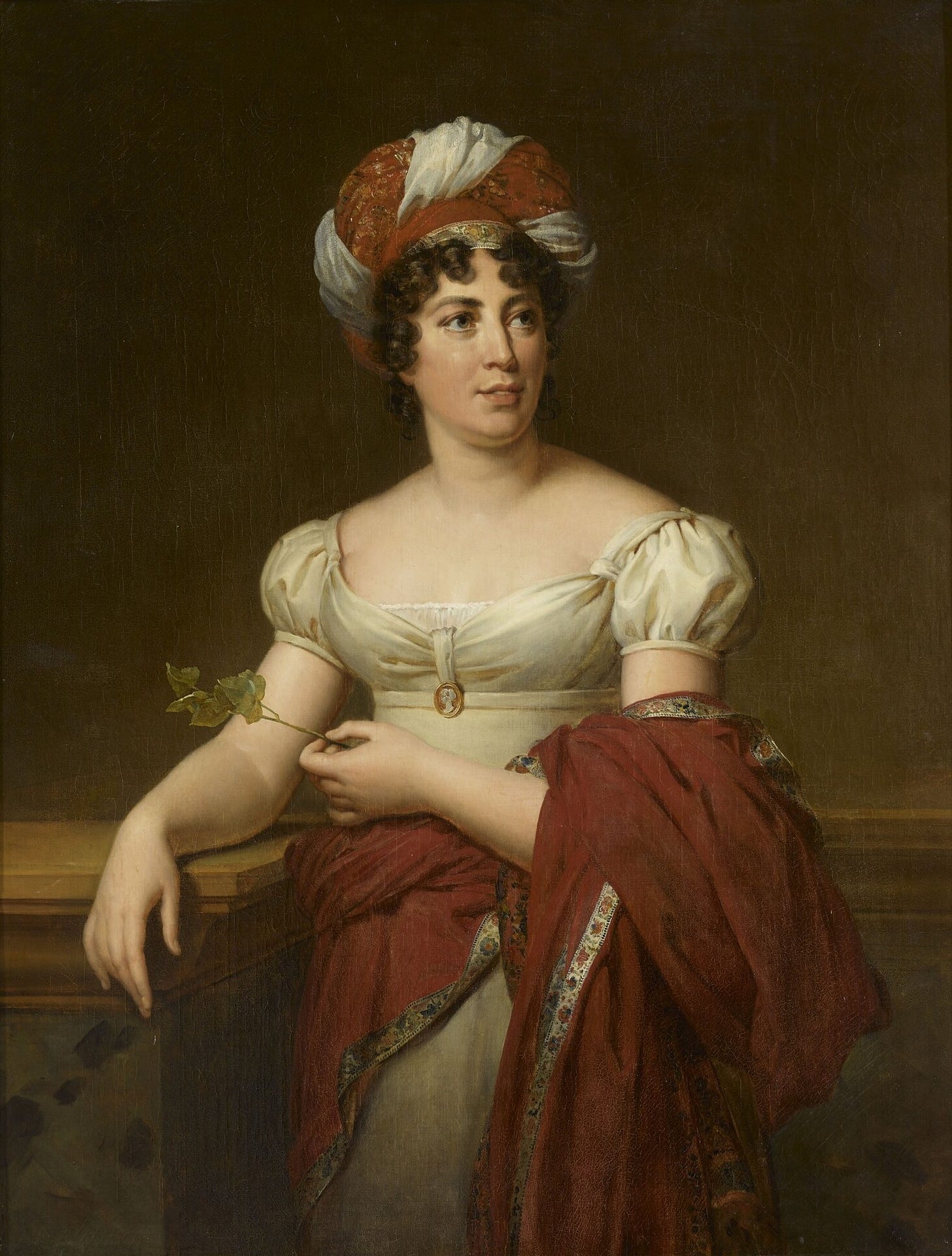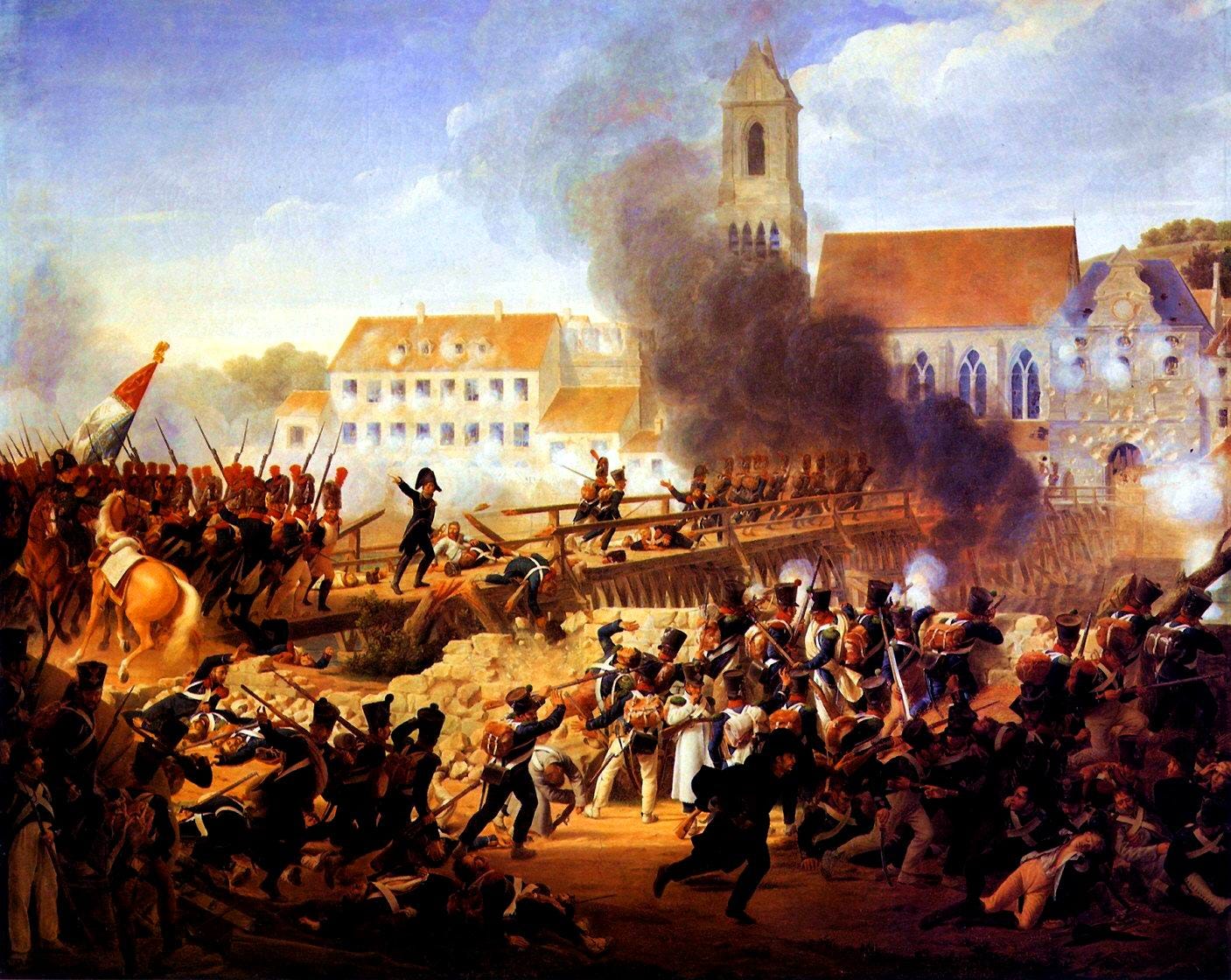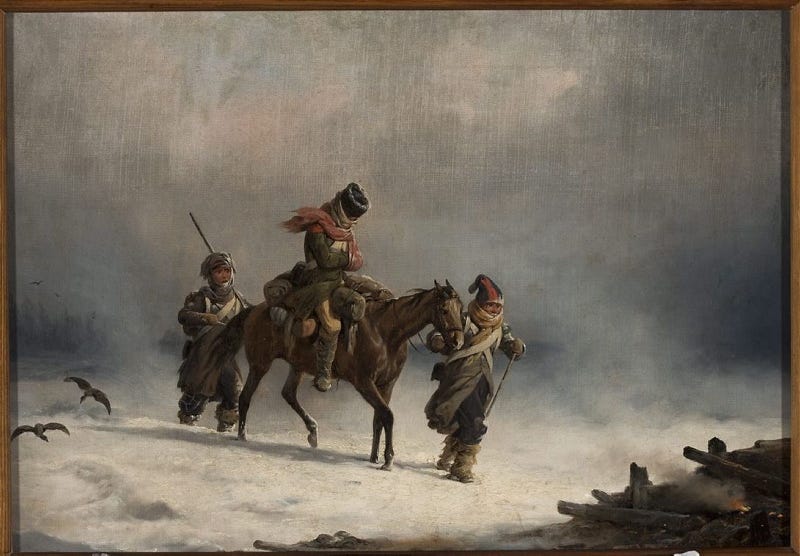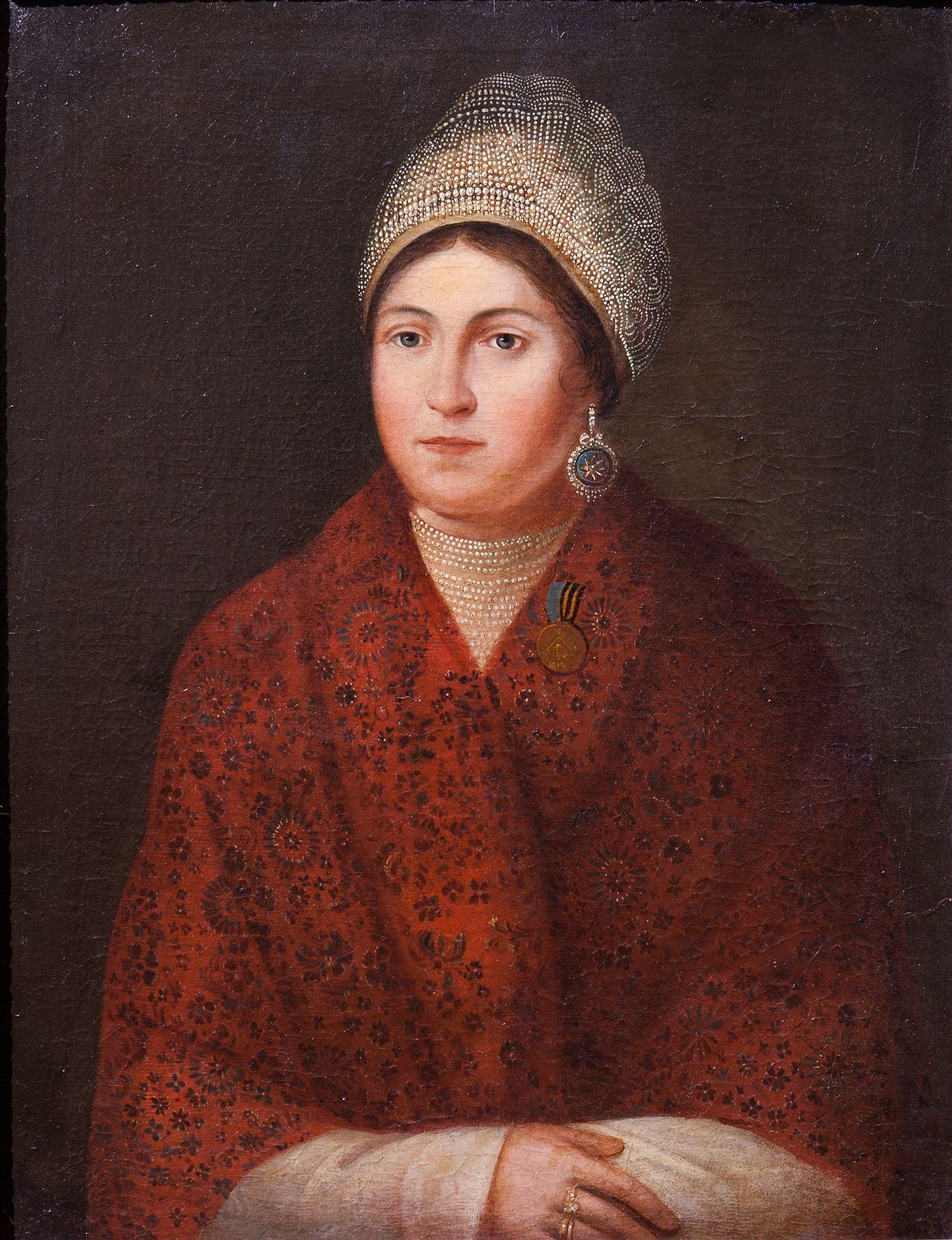Negative Numbers
War and Peace Week 43: Book 4, Part 2, Chapter 17 – Part 3, Chapter 4
📖 This is a long post and is best viewed online here.
👆 To get these updates in your inbox, subscribe to Footnotes and Tangents and turn on notifications for War and Peace 2024.
🎧 This post is now available as a podcast. Listen on Spotify, YouTube, Pocket Casts or wherever you get your podcasts.
Welcome to Week 43 of War and Peace 2024
This week, we have read Book 4, Part 2, Chapter 17 – Part 3, Chapter 4.
Everything you need for this read-along and book group can be found on the main War and Peace page of Footnotes and Tangents. There you will find:
The reading schedule with links to daily chat threads for each chapter.
Weekly updates like this one.
Are you enjoying our slow read? I need your help!
In November, I will launch the 2025 slow read of War and Peace. If you have enjoyed reading with us this year, I would love to hear from you. Your feedback will be enormously helpful for new readers deciding whether to join us in 2025. What were your expectations? What was your experience of reading slowly as part of a group? What surprised you? And would you recommend this slow read? If you are happy for me to share your thoughts with future readers, I have started a chat thread for testimonials, or you can send me a DM or email. Thank you so much for your time.
This week’s theme: Negative Numbers
Denisov! Dolokhov! Algebra?
This week hits us hard with the best and – depending on your tastes – the worst of War and Peace.
Book 3, Chapter 2, the Maths Chapter, will traumatise anyone still haunted by solving quadratic equations at school. If Tolstoy, the history teacher, was too much for some, Tolstoy, the maths prof, may be the final straw.
I imagine Tolstoy’s editor fidgetting with his buttons, saying:
‘Look, Leo, the algebra is nice, but I think it might not be the best bit to begin with. Let’s push it back to page 1,111. Why don’t we start with a party? Something about a bear? People love bears.’
The curious thing about all this maths is that Tolstoy uses it to explain that there is something immeasurable at play in historical events: the spirit of individuals and groups. Historians can consider the size of armies, but there is an unknown factor that is a greater determiner of how life plays out.
Earlier in the year, the two armies swept along the road between Smolensk and Moscow, stripping the region of food and supplies. The French are now retreating along the same road, as the weather worsens and spirits ebb. Starving, the cavalry units eat their horses and flee on foot across hostile territory.
They are facing guerrilla warfare, partisan peasants and Cossack horsemen, picking off isolated units and disappearing back into the forests.
We shouldn't be too surprised to find Denisov and Dolokhov leading irregulars into battle. Neither of them were keen on the strict hierarchies of the organised army, both faced disciplinary action. Here, they are in their element.
And so enter Petya Rostov. He's worried about the state of his trousers, bless him. This detail tells us a lot. Like his older brother at the start of the novel, he doesn't know what he is getting himself into. There is no distinction in his mind between the world of regiments and officers, and this total war that is coming.
Because the horror rising in these chapters is the cudgel. War with no limits, no end and no rules.
As Tolstoy writes, ‘as if there were any rules for killing people.’
Chapter 17: As If Fighting Were Fun
Kutuzov spends his sleepless nights considering the thousands of contingencies facing them as they wait for the French to make the first move. When the generals file in and tell him that Napoleon has abandoned Moscow, he turns to a dark corner of his room and speaks to God: ‘Russia is saved.’
Kutuzov • Toll • Konovitsyn
Patience and time are my warriors, my champions.
What does age and wisdom grant you? The understanding that war and peace are not a game; that there is never only one or two contingencies; that nothing is ever certain.
In a world where everyone feels they know what's going on, the one-eyed general says, 'Not yet.' Tolstoy likes the silent cogs and the patience champions; he is unimpressed by showy bluster and the certainties of youth.
Kutuzov’s prayer arrives hot on the heels of Pierre’s laughter. I think they should be read together. The world mistakes their passivity for stupidity when, in fact, it is their receptiveness to life that is the bedrock of their wisdom.

Napoleon’s Nemesis
Kutuzov is writing letters to Germaine de Staël, the political theorist, woman of letters and vocal opponent of Napoleon. Madame de Staël had recently visited St Petersburg, where she was received by Alexander I and predicted Kutuzov’s success in defeating the French invasion.
Germaine de Staël’s father was King Louis XVI’s finance minister, Jacques Necker, who had made the fateful decision in 1788 to increase the numbers of non-aristocratic representatives at the Estates-General. A champion of representative democracy, she compared Napoleon to Machiavelli’s prince; Bonaparte said she should stick to knitting.
In exile, she became a leading hostess of Europe’s salons. She wrote sentimental literature and championed the spread of Romanticism. She advocated the abolition of slavery (writing to Thomas Jefferson on this point) and believed in gender equality and women's active participation in the political sphere.
Further resources:
Chapter 18: The Chemical Elements of Dissolution
For the rest of the campaign, Kutuzov does everything in his power to restrain his troops. At a war council at Malo-Yaroslavets, the ‘simple-minded’ George Mouton tells Napoleon that the only course of action is flight. The next day, Napoleon is almost captured by Cossacks. The French army retreats down the Smolensk road.
Napoleon, with his forty-year-old stomach...
This is a salty comment from Tolstoy, reminding us of Napoleon's youth relative to Kutuzov and that this supposed cerebral man of genius is as susceptible as the rest of us to the sinking feeling in the gut.
What historians attribute to strategy, Tolstoy consigns to instinct, a course of action obvious to anyone who can feel, so the simple-minded George Mouton says what everyone already knows is true: The war is lost, and so is the army.
Nothing for it but to hit the road and run.

Napoleon’s Sheep
Georges Mouton was the aide-de-camp who spoke truth to power at Malo-Yaroslavets. He had distinguished himself at the Battle of Landshut in 1809, where Napoleon had quipped ‘Mon Mouton est un lion’ (My sheep is a lion). He was known for his independent mind, criticising Napoleon’s strategy at Austerlitz, Smolensk and again in Moscow. Despite his opposition, he stayed in Napoleon’s favour and accompanied the emperor back to France.
Further reading:

Chapter 19: The Promised Land
The French army retreats towards their promised land, but France is so remote that they aim initially for Smolensk, hoping for food and fresh troops. Each of them desires to give up and surrender, but momentum prevents them from doing so. Nor can the Russians cut off or halt the French retreat as it pursues its fatal path.
A person in motion always devises an aim for that motion.
Tolstoy resists nihilism: people must have a purpose, even if they are mistaken. We believe in something, even if it is just food and shelter 40km away. In a humane world, these men would surrender, and many lives might be spared. But what's horrible is that neither side is capable of doing the rational thing.
The French flee and die. The Russians attack and die. The result is meaningless slaughter.
Book Four, Part Three
Chapter 1: Modern Warfare
Tolstoy argues that the war in 1812 broke the rule that says that armies that win battles, gain the right to control a country. The French won Borodino and occupied Moscow, but the Russians refused to play by the rules, raising ‘the cudgel of the people’s war’ against the mortally wounded Grande Armée.
As if there were any rules for killing people.
Tolstoy is describing something all too familiar to us. Wars with no rules and no winners. Napoleon in this chapter looks like the last general from a different age: he complains that his opponent isn't playing fair.
But all wars will be like this from now on: blurring the lines between combatants and non-combatants, the destruction of cities, and drawn-out asymmetrical conflicts with no end. Tolstoy sees our terrible future of no peace but total war.
Chapter 2: Military Maths
Tolstoy tells us that military science assumes that larger armies will always defeat smaller ones, despite countless examples in history to the contrary. What is missing is a measurement of the unknown quantity of the spirit of the army. The high spirit of the Russians in 1812 allowed them to defeat the French by dividing up into smaller units: a guerilla partisan war.
This chapter gives me a headache, combining as it does both military strategy and maths. But the nub of the argument is this: in any conflict, there is an unknown quantity, which is the spirit of those compelled to kill or be killed.
It is the strength of that mysterious quantity that will determine the nature and outcome of a war. Russian spirits are high, and they are engaging in guerilla warfare. And if we turn the page, we may be about to meet some of those guerillas.

Chapter 3: The Partisans
A partisan war begins, destroying the great French army piecemeal. We catch up with two small groups of guerillas led by none other than Denisov and Dolokhov. They turn down requests to unite with larger parties and instead plan their own attack on a convoy of cavalry baggage and Russian prisoners. Their first attempt to get intelligence results only in the capture of a little drummer boy.
‘No bwother, I have gwown moustaches myself.’
Which is to say, he wasn't born yesterday. After several hundred pages, Tolstoy finally gives us both the Ds, who, of course, are alive and well and harrying the French.
You may remember that Denisov originally asked Kutuzov if he could lead a raid before Borodino behind enemy lines. That was actually Denis Davydov's idea, a real life hussar who is now leading the partisans, if anyone can be said to be leading them.
Who are you happier to see, Denisov or Dolokhov?
Do you think they will work well together?

The forgotten story of female soldiers
A sacristan commanded one party which captured several hundred prisoners in the course of a month; and there was Vasilisa, the wife of a village elder, who slew hundreds of the French.
A sacristan is a member of the church, responsible for the care of a religious building and its contents. Visilisa was Vasilisa Kozhina, who lived near Smolensk, in the path of the invading and retreating armies.
When her husband had been murdered by French soldiers, she was elected starosta (village elder) in place of her husband. When the French returned from Moscow, she invited them to her house to eat, locked the doors, and burned them alive.
One account describes her as ‘a woman of Herculean stature and great physical strength. She was beautiful in appearance and brave and decisive in character.’ She fought with a pitchfork and reputedly killed many French soldiers. Her detachment of women and teenagers harassed the retreating Grande Armée.
Like many stories surrounding ‘the patriotic war’, Vasilisa Kozhina’s tale has been embellished and romanticised over time. Two centuries later, she even got her own feature film.
I would have liked Tolstoy to have done a bit more with this and explored the role of women as active participants as well as victims of conflict. Archaeologists have found remains of a female Viking warrior on the Swedish island of Björkö. In the 18th century, all-female regiments fought for the Kingdom of Dahomey in modern-day Benin. Some 119 cross-dressing women served Holland between 1550 and 1840, and as many as 1,000 women may have fought on both sides of the American Civil War.
Up to a million women served in the Red Army of the Soviet Union during the Second World War. Official records downplayed the role of these women and their stories remained unheard and unrecorded for decades. The Belarusian oral historian Svetlana Alexievich documented these narratives in her incredible book The Unwomanly Face of War. She won the 2015 Nobel Prize in Literature ‘for her polyphonic writings, a monument to suffering and courage in our time.’
Further reading:
Chapter 4: Petya’s Trousers
Denisov is in a grumpy mood, because of the rain and his empty belly. He is waiting for news from Dolokhov when a young officer arrives with a message from a partisan commander. The young man is Petya Rostov. After Denisov reads the message, Petya asks him whether he can stay with his party.
All the way Petya had been preparing himself to behave with Denisov as befitted a grown-up man and an officer.
Out of nowhere comes little Rostov, trying desperately to be a man. Denisov is hangry. but Petya thinks it is because of the condition of his trousers.
Tolstoy paints a vivid scene: The esaul, using big words to differentiate himself from the common Cossacks. Behind them, the horses and men, sodden and steaming. The little drummer-boy with his cold red hands.
And Petya, who shouldn't be here.
Thank you for reading
Thank you for reading and joining me on this slow read of War and Peace.
Before I go, a reminder that I am looking for testimonials to recommend this read-along to readers joining us in 2025. If you can help, just drop me a DM on Substack, send me an email or leave a comment below. And if you have enjoyed this post and found it helpful, please consider leaving me a tip over on Stripe. These donations always make my day and remind me that this project is worthwhile and finding a good home.
And that’s all for this week. I love to read your thoughts in the comments and the chat threads. Have a great week, and I’ll see everyone here next Sunday for more War and Peace 2024.



I’m so glad I joined the slow read, it’s been a brilliant experience and I’ve gained so much more insight into War & Peace, than if I’d just read alone.
I really look forward to reading one manageable chapter each morning and then get the benefit of Simon’s intelligent and illuminating notes on the chapter, followed by the comments of others who are reading along too. The interaction is so helpful.
I can’t recommend the experience highly enough. Just give it a try, you won’t regret it.
More on Napoleon's stomach
https://pmc.ncbi.nlm.nih.gov/articles/PMC8572813/